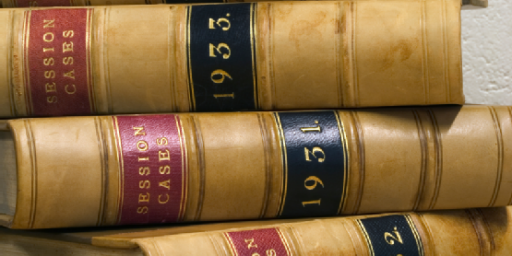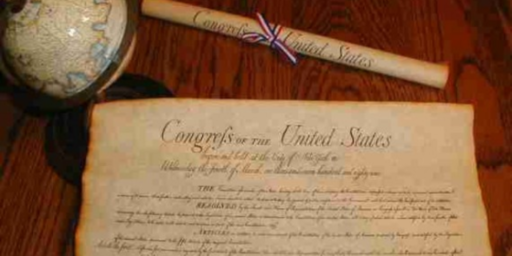Supreme Court Finds Broad Right To Privacy In Contents Of Smartphones
A unanimous Supreme Court rules that the Fourth Amendment bars police from searching your electronic device without a warrant.
In a surprisingly unanimous ruling, the Supreme Court today ruled that police must nearly always obtain a search warrant before examining the contents of a cell phone or smartphone even when the owner of the phone is under arrest:
WASHINGTON — In a major statement on privacy rights in the digital age, the Supreme Court on Wednesday unanimously ruled that the police need warrants to search the cellphones of people they arrest.
Chief Justice John G. Roberts Jr., writing for the court, said the vast amount of data contained on modern cellphones must be protected from routine inspection.
The old rules, Chief Justice Roberts said, cannot be applied to “modern cellphones, which are now such a pervasive and insistent part of daily life that the proverbial visitor from Mars might conclude they were an important feature of human anatomy.”
The courts have long allowed warrantless searches in connection with arrests, saying they are justified by the need to protect police officers and to prevent the destruction of evidence.
But Chief Justice Roberts said neither justification made much sense in the context of cellphones. On the other side of the balance, he said, is the data contained on the typical cellphone. Ninety percent of Americans have them, he wrote, and they contain “a digital record of nearly every aspect of their lives — from the mundane to the intimate.”
Even the word “cellphone” is a misnomer, he said. “They could just as easily be called cameras, video players, Rolodexes, calendars, tape recorders, libraries, diaries, albums, televisions, maps or newspapers,” he wrote.
Chief Justice Roberts acknowledged that the decision would make law enforcement more difficult.
“Cellphones have become important tools in facilitating coordination and communication among members of criminal enterprises, and can provide valuable incriminating information about dangerous criminals,” he wrote. “Privacy comes at a cost.”
The court heard arguments in April in two cases on the issue, but issued a single decision.
The first case, Riley v. California, No. 13-132, arose from the arrest of David L. Riley, who was pulled over in San Diego in 2009 for having an expired auto registration. The police found loaded guns in his car and, on inspecting Mr. Riley’s smartphone, entries they associated with a street gang.
A more comprehensive search of the phone led to information that linked Mr. Riley to a shooting. He was later convicted of attempted murder and sentenced to 15 years to life in prison. A California appeals court said neither search had required a warrant.
The second case, United States v. Wurie, No. 13-212, involved a search of the call log of the flip phone of Brima Wurie, who was arrested in 2007 in Boston and charged with gun and drug crimes. The federal appeals court in Boston last year threw out the evidence found on Mr. Wurie’s phone.
Lyle Denniston analyzes the opinion, which as he notes is about as broad a protection for privacy as we could have hoped for:
Treating modern cellphones as gaping windows into nearly all aspects of the user’s life and private conduct, the Supreme Court on Wednesday unanimously ordered police to get a search warrant before examining the contents of any such device they take from a person they have arrested. Seeing an individual with a cellphone is such a common thing today, Chief Justice John G. Roberts, Jr., wrote, “the proverbial visitor from Mars might conclude they were an important feature of human anatomy.”
The Court rejected every argument made to it by prosecutors and police that officers should be free to inspect the contents of any cellphone taken from an arrestee. It left open just one option for such searches without a court order: if police are facing a dire emergency, such as trying to locate a missing child or heading off a terrorist plot. But even then, it ruled, those “exigent” exceptions to the requirement for a search warrant would have to satisfy a judge after the fact.
The ruling was such a sweeping embrace of digital privacy that it even reached remotely stored private information that can be reached by a hand-held device — as in the modern-day data storage “cloud.” And it implied that the tracking data that a cellphone may contain about the places that an individual visited also is entitled to the same shield of privacy.
The Court’s ruling drew some suggestions by Justice Samuel A. Alito, Jr., to narrow its scope, but it did not accept those. The result was the broadest constitutional ruling on privacy in the face of modern technology since the Court’s ruling two Terms ago limiting police use of satellite-linked GPS tracking of a suspect’s movements by car.
On a personal level, the decision wiped out the convictions of a San Diego, California, man and a man from Boston, because evidence obtained from their cellphones was used to help gather evidence against them and helped lead to their convictions.
In purely technical constitutional terms, the ruling put strict new technology-based limits on a century-old doctrine on police authority to search: the idea that, once police had arrested an individual, they could search items that person had brought along, in person or within reach in a car. Such a “search incident to arrest” exception to the Fourth Amendment warrant requirement had been a feature of criminal law since it was first mentioned by the Court in 1914.
The Court did not cast aside any of its prior rulings allowing police to make such searches; it simply declared that they do not apply to cellphones, because of the nature of those digital devices. “Today,” the Chief Justice wrote, “it is no exaggeration to say that many of the more than ninety percent of American adults who own a cell phone keep on their person a digital record of nearly every aspect of their lives — from the mundane to the intimate.”
Chris Greidner goes into more detail, as does Ian Millhiser, and Orin Kerr at The Volokh Conspiracy points out the significance of the ruling:
The Court’s opinion offers a major endorsement of treating computer searches differently than physical searches. Although the opinion is phrased primarily about “cell phones,” Chief Justice Roberts makes clear that “cell phones” are really just “minicomputers.” And if you take the reasoning of Riley to apply to other minicomputers and to electronic storage devices generally — which I think is the fairest reading of the opinion — then it means that lots of other applications of the Fourth Amendment to computers are now in play. As readers of the blog know, the lower courts are struggling to apply old principles of the Fourth Amendment to the new facts of computers. I think Riley can be fairly read as saying that computers are a game-changer: We’re now in a “digital age,” and quantity of data and the “qualitatively different” nature of at least some digital records changes how the Fourth Amendment should apply.
That’s a big deal. It means that Riley may just be the tip of the iceberg. Computers have now generated a very different rule for searches incident to arrest: The police have to follow one rule for physical evidence and a different rule for digital evidence. If that’s true for searches incident to arrest, what other rules are also going to change?
Kerr also goes on to note the unanimity in the decision, as does Ilya Shapiro, and I think they are both correct that there’s something significant there. While it’s true that there have been a slew of unanimous decisions this term, and that Justices tend to agree with each other a lot more than people might think if they only pay attention to the high profile cases, the Fourth Amendment has typically been an area where there have been sharp divisions between the Court’s liberal and conservative bench. Indeed, in the years since William Rehnquist became Chief Justice in 1986, and even before then, much of the Court’s 4th Amendment jurisprudence has consisted of the Court’s conservative wing chipping out exemptions from the Warren Court’s path breaking work in this area to give law enforcement more and more leeway to conduct warrantless searches. The fact that this is unanimous suggests that there is broad support for what is most likely the most important part of this ruling, the establishment of different rules regarding electronic searches that are in many ways broader than the protections that the court has typically given to physical searches. As Kerr notes, this is a holding that has significance far beyond the facts of these cases and, indeed, could have significance for future cases involving everything from the expectation of privacy in data stored in the cloud to the National Security Agencies data mining programs. We obviously cannot predict how the Court will decide those cases, but at the very least the holding here is a good sign that they are headed in a direction toward protecting liberty and privacy.
When I wrote about the oral argument in this case, it seemed unclear where the Court might be headed with these cases. While the Justices seemed sympathetic to the idea that the 4th Amendment should require a warrant in these situations, there was much disagreement and confusion expression over what the limits of the right might be and what exceptions might apply. In this opinion, though, Chief Justice Roberts went with the widest rule possible, ruling that a warrant is required except in exigent circumstances, which is a long standing and understandable exception to the warrant rule. What exactly constitutes an “exigent” circumstance, of course, is something that will have to be hashed out in subsequent cases, but since these rules apply to situations where the owner of the phone is already in custody in most cases, it seems as though the range of exigent circumstances would be narrow indeed. For example, if the police arrest someone suspect of abducting a child a search of the phone to find clues to the child’s location would, arguably, be warranted (although in that case it would seem to be very easy to get a warrant on short notice). Additional exigent circumstances would likely exist in cases where it is suspected that there is some other ongoing crime being committed, or one that is imminent. Terrorist attacks are one obvious example of such a situation. For the most part, though, this ruling means that, going forward, police cannot search someone’s phone without a warrant, or without first obtaining their consent to do. On the whole, it was a good day for privacy and the Fourth Amendment.
Here’s the joint opinion in Riley and Wurlie:
Riley v. California / U.S. v. Wurie Opinion by Doug Mataconis







I was expecting a middle-ground compromise decision to placate the police, but this is fantastic. This gives me a little bit of hope that they’ll rule likewise when an NSA challenge reaches them.
The SCOTUS is on a roll…coming down with some good rulings…even going the right way on some no-brainers.
Remarkable.
I fully expect them to fvck that up with the Hobby Lobby and NLRB rulings.
Do the police have the authority to block a remote wipe of the phone, at the carrier level, to prevent the destruction of evidence?
And, do they have the authority to copy — but not examine — the contents of the phone while waiting for the warrant, again to prevent the destruction of evidence.
Both of these would seem reasonable on the face of it, although hard to implement securely.
As C. Clavin notes, this is truly remarkable.
I think the Justices are making a correction here, in an era when the NSA and police seemingly
arewere allowed to do whatever they wanted to do. Simply because they’re supposedly the “good guys” always doing the “right thing”.@Gustopher:
The court specifically mentioned that destruction of evidence due to remote wiping isn’t an issue because the police already have the means to prevent that (e.g. faraday bags). So that sounds to me like the court is saying yes, the police have the power to block remote wipes. That should also moot the point of your second question about copying the contents while waiting for a warrant.
This ruling made my day. Not only the right decision, but a thunderous unanimous decision that closed with these words:
<blockquoteOur answer to the question of what police must do before searching a cell phone seized incident to an arrest is accordingly simple — get a warrant.
I’m hoping against hope that this is a true landmark decision that will go a long way toward establishing electronic privacy for Americans. If it does, this could have as big an impact as Miranda.
Out of curiosity, and I don’t mean this in a snotty way, but are court-watchers ever right in their interpretation of justices’ leanings during oral arguments? These are well-trained lawyers, familiar enough with each other to play off each other. They’re willing to ask questions that are helpful or hurtful to the presenting lawyers – and smart enough to not always be clear which questions are which. They often try to tease out the strengths and weaknesses of proposed rules. And one justice has very little interest in oral arguments, relying on the written word instead. So I just don’t know if, even in theory, a person can read the justices accurately, and I don’t think court-watchers have been able to do so in practice.
@Ben: I will admit to not having read the opinion. Having the justices directly address this is great — gives the police an explictly court-approved method of preserving evidence, while not putting the accused’s privacy at risk.
Now to see how this plays when Customs plays the Border Search Exception. Otherwise, a good decision.
@Pinky: Short answer, no, you can’t judge how a Justice is going to rule based on the questions. There are too many reasons to ask the same question to be able to determine where they are going.
Excellent news. Anything that slows the erosion of individual rights and the militarization of law enforcement is welcome at this point.
I wonder what Lester Freamon would make of this.
@Hal_10000: This does have the exception that if the officers have a strong cause to search the phone records to reveal the location of possible victims, bombs, plans for an attack, or other immediate danger that they can do that without a warrant. This is usual, expected, and certainly desired to protect the public from criminals.
I have always wondered if, during license checks, and routine traffic stops, if the police would check the trunks or interiors of vans just how many lives could be saved in one year: kidnap victims, abuse victims, escaped murderers on the run, and mob crime victims bound in trunks. It would probably be shocking. But if just one life was saved, it would have been worth it.
“Reasonable suspicion ….reasonable suspicion” (Clint Eastwood, “The Gauntlet”)